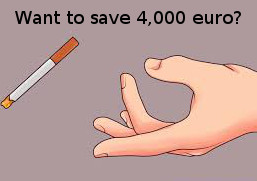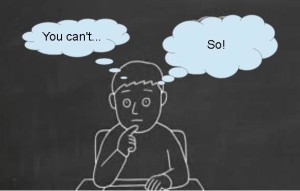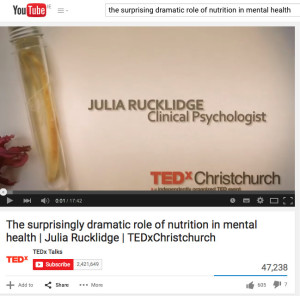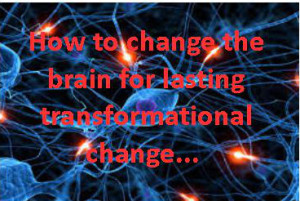I came across this list in Forbes. They listed the top 25 regrets people have. I’ve commented on the top 10.
Reading them I realized that every one of them can be avoided or greatly reduced when a person has self belief, confidence, courage and lovingness – along with the skills to let go of fear and heal burdensome memories – all abilities that any of us can learn and develop.
REGRETS…
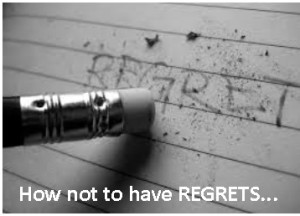
1. Working so much at the expense of family and friendships. How do you balance meeting that short-term deadline at work and sitting down for dinner with your family? There are worries. “What will my boss and co-workers think? It’s not a big deal if I stay late this one time. I’ll make it up with the family this weekend.” But the “making up” never seems to happen. Days turn to months and then years and then decades.
SOLUTION: Being able to say ‘no’. Being able to handle whatever anxiety, fear and worry come up saying no. Feeling deserving of a good life. Being able to have good working boundaries. Valuing yourself – not being a doormat or excessively people pleasing. Being able to take a step back and respond to the situation with perspective. Being aware of what’s truly important and having the courage to prioritize that.
2. Not standing up to bullies in school and in life. Believe it or not, a lot of our biggest regrets in life have to do with things that happened to us in early age. We never seem to forget – or forgive ourselves – for not speaking up against the bullies. We were too scared. We wish we had been more confident. And by the way most of us have also met up with a bully in our work life. Maybe he was our boss. We remember that one time we wish we’d told him off – even if it cost us our job.
SOLUTION: Letting go past emotional hurts and burdens. Learning how to forgive in such a way that we no longer regret our behavior and can move on from the experience.
3. Not staying in touch with some good friends from my childhood and youth. There’s usually one childhood friend who we were best buddies with. Then, one of us moved away. We might have stayed in touch at first but then got busy. Sometimes, we thought to pick up the phone, but maybe we don’t have their number or email any more. We always wonder what it would be like to sit down with them again for a coffee.
SOLUTION: Having the loving courage to look them up and contact them. Also being able to be open to new friendships and to be able to handle loss in such a way as to recover and move on. Believing ourselves to be lovable and worthy of friends.
4. Turned off my phone more/Left my phone at home. Many of us can’t get off our phone/email addiction. We sleep with it next to us. We carry it with us constantly. It’s right next to us in the shower, just in case we see a new email icon light up through the steamed up shower glass. We know constantly checking email and Twitter in the evenings and on weekends takes us away from quality time with family and friends. Yet, we don’t stop.
SOLUTION: Awareness and mindfulness of our actions. Being able to stay present to others and be involved in conversations.
5. Breaking up with my true love/Getting dumped by them. Romance is a big area of regret for most of us. Maybe we dumped someone that we wish we hadn’t. Maybe they dumped us. Most play a never-ending game of “what might have been” for the rest of their lives. It is tough to simply be happy with the love that you’ve found and takes away from the special moments you have today, if you’re constantly thinking back to what you once had — which actually might not have been half as good as we think it was.
SOLUTION: Being able to resolve deep emotional hurt. Being able to form relationships and value ourselves and others.
6. Worrying about what others thought about me so much. Most of us place way too much importance on what other people around us think about us. How will they judge us? In the moment, we think their opinions are crucial to our future success and happiness. On our death beds, none of that matters.
SOLUTION: Resolve the worry that deep down we’re ‘not good enough’, ‘unlovable’ or ‘going to be found out’. We have these unresolved fears and worries and they can ruin our lives.
7. Not having enough confidence in myself. Related to the previous point, a big regret for most of us is questioning why we had such little confidence in ourselves. Why did we allow the concerns of others to weigh so heavy on us instead of trusting our own beliefs? Maybe we didn’t think we were worth having what we wanted. Maybe we just thought poorly of ourselves. Later on, we wish we could have been more self-confident.
SOLUTION: Question the lack of self belief. Challenge those limited ideas we have about ourselves. Learn how to deal with and let go of feelings of unworthiness, self-consciousness & doubt.
8. Living the life that my parents wanted me to live instead of the one I wanted to. Related to that lack of confidence, a lot of us get sucked into living the life that we think a good son or daughter should live. Whether because we’re explicitly told or just because we unconsciously adopt it, we make key life choices – about where to go to school, what to study, and where to work — because we think it’s what will make our parents happy. Our happiness is derived through their happiness – or so we think. It’s only later – 1o or 20 years on – where we discover that friends around us are dying and we’re not really doing what we want to do. A panic can start to set in. Whose life am I living any way?
SOLUTION: Become more self-aware – ‘what would I like’ & ‘what are my dreams and values’. Also become aware of how we fear disappointing our parents or how much we fear that we won’t have a connection with them if we do our own thing. This is an emotional dilemma many face, but which is resolvable.
9. Not applying for that “dream job” I always wanted. Maybe we didn’t apply for that job we always wanted to because of a child, or because our spouse didn’t want to move cities. It might not have been the perfect job for us, but we always regret not trying out for it.
SOLUTION: Take responsibility for decisions, communicate clearly, look for creative solutions, ask for support etc. Let go of the fear that we’re ‘selfish’ or going to lose approval from others if we aim for what you want.
10. Been happier more. Not taken life so seriously. Seems strange to say, but most of us don’t know how to have fun. We’re way too serious. We don’t find the humor in life. We don’t joke around. We don’t think we’re funny. So, we go through life very serious. We miss out on half (or maybe all) the fun in life that way.
SOLUTION: Do something a little silly today. Crack a joke with the bus driver – even if he ends up looking at you weird. Do a little dance. You’ll probably smile, on the inside if not the outside. Now keep doing that, day after day.
Challenge the worrisome thoughts and fears of looking like a fool. Be grateful for what is right now.
11. Gone on more trips with the family/friends.
12. Letting my marriage break down. There are usually lots of signs and problems leading up to separation. The regrets most of us have is that we didn’t correct some or most of those “little things” along the way.
13. Taught my kids to do stuff more. Kids love their parents, but they love doing stuff with their parents even more.
14. Burying the hatchet with a family member or old friend. We think we’ve done all we can and washed our hands of the relationship. We’ll usually regret it when the other is no longer around.
15. Trusting that voice in the back of my head more. Whether it’s as simple as taking a job we weren’t really thrilled about or as complex of being the victim of some crime, most of us have had the experience of a little voice in the back of our heads warning us that something was wrong here. A lot of times, we override that voice. We think that we know best. Most of the time, we learn later that voice was dead right.
16. Not asking that girl/boy out. Nerves get the best of us – especially when we’re young. We always wish we could have just said what we really felt at the time.
17. Getting involved with the wrong group of friends when we were younger. We’re impressionable when we’re young. We never start out thinking our choice of friends could lead us to difficult outcomes – but regret it later.
18. Not getting that degree. It leads to feeling insecure, almost like being worried they are going to be “found out
19. Choosing the practical job over the one I really wanted.
20. Spending more time with the kids.
21. Not taking care of my health when I had the chance. Everyone doesn’t think of their health – until there’s a problem. And at that point, we promise ourselves if we get better we’ll do a better job with our health. It shouldn’t take a major calamity to get us to prioritize our health and diet. Small habits every day make a big difference here over time.
22. Not having the courage to get up and talk at a funeral or important event. When you’re close to death, you’re probably going to wish you’d gotten over those fears on at least a few occasions, but especially at a loved one’s funeral or some important event like a wedding.
23. Not visiting a dying friend before he died.
24. Learning another language.
25. Being a better father or mother.
If these or other regrets are troubling you feel free to get in touch. I’m always happy to chat about how life can improve.
You can reach me at 01 207 9615 or drop me a line to
Info@DublinMindTraining.com
Have a great week,
Ailish
